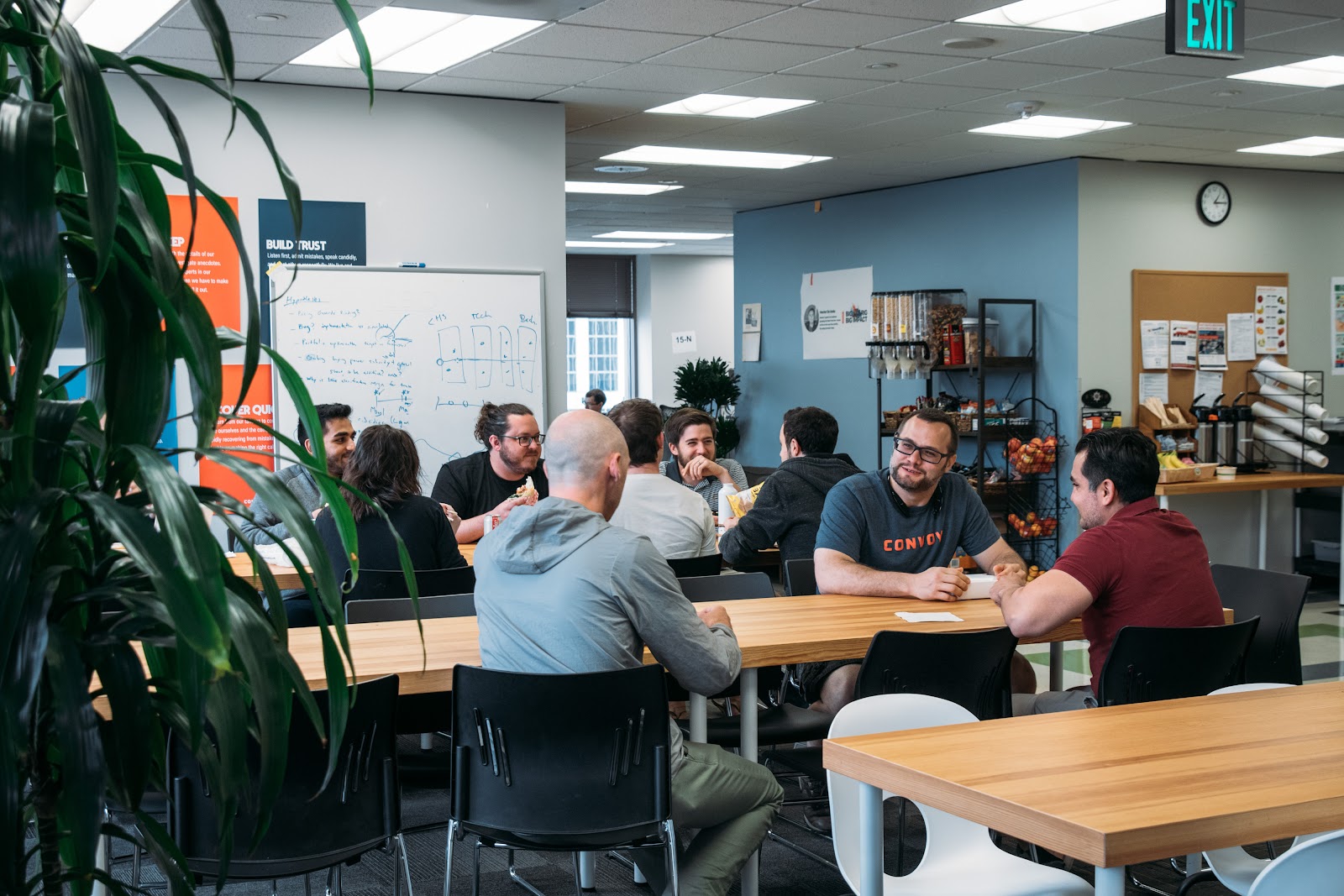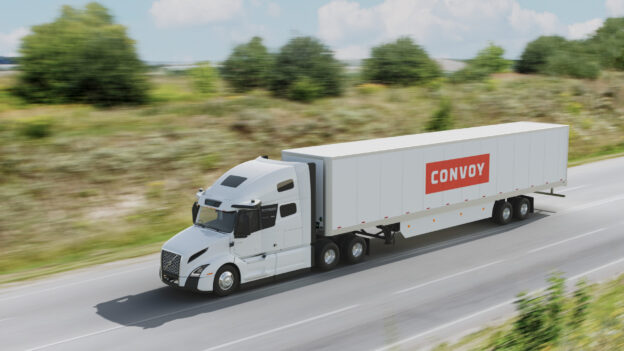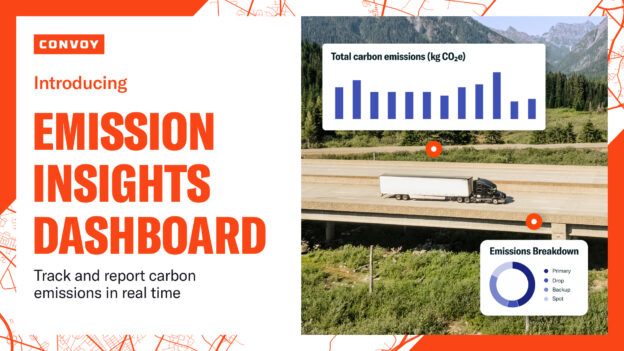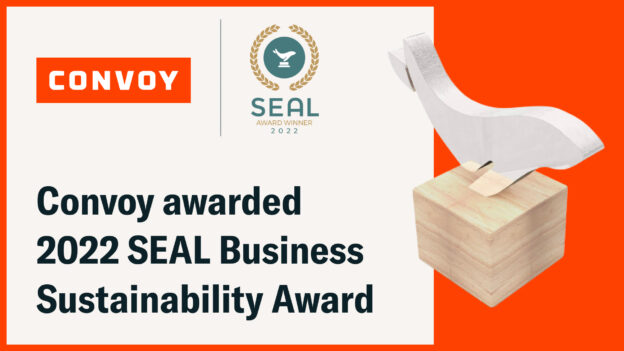Reporting on Convoy’s Environmental Impact
Sustainability • Published on July 16, 2021
Convoy strives to reduce waste and deliver value, not only for shippers and carriers but for our operations as well. Our approach to sustainable business is through trust and transparency in everything we do. That’s why we’re sharing our own carbon emissions — for the purpose of understanding where we are today and acknowledging that we have some work to do of our own. We need to set aggressive goals for how and where we can improve.
This year we partnered with the team at Emitwise to collect, analyse, and report on our scope 123 emissions. These are our results and actions to take to reduce our environmental impact.
Sources of our emissions
Commuting
Convoy’s headquarters are in Seattle, home to approximately 70 percent of its employees, with a second office in Atlanta, home to the remaining 30 percent. Both offices are in downtown areas that make it easy to commute by public transit, biking, or walking.
How we commuted, pre-pandemic

Commuting emissions drastically fell in March as Convoy switched to remote work as a result of COVID-19. From January to March, Convoy employees emitted 608,034 pounds of carbon emissions via daily commutes, but the pandemic pushed Convoy to re-evaluate our practices. We implemented work-from-home policies that reduced our commuting emissions by 97 percent from March to December. Today, fewer than 10 percent of employees commute to the office at all.
Office Workspaces
In our workspace, all employees — including our executive leadership team — work in an open seating model, fostering a vibrant and inclusive place to work. Open seating models also require less square footage than individual offices, resulting in less energy spent overall.
In aggregate, Convoy has ~144,000 square feet of office space and that requires an estimated 2,600,000 kWhs of electricity in 2020. To reduce emissions from building energy, both our Seattle and Atlanta buildings are LEED Gold certified, which reduces our energy footprint by about 20 percent and saves a total of 115,000 pounds of carbon annually.
Servers, Software, and Hardware
In addition to building energy, Convoy also provides every new employee with hardware and office supplies (i.e., a laptop, desk, chair, and monitor). Manufacturing these products comes with a cost of carbon emissions. In 2020,our purchased goods and services equated to roughly 1,279,000 pounds of CO2. Looking ahead to 2021, we will start to evaluate the sustainability of these products, both in the production and supply chain phase but also the end-of-life phase of each product.
As a tech company, we rely on cloud servers to store our data and power our company, which contributes to our Scope 3 emissions. In 2020, Convoy’s servers used an estimated 431,219 kWhs, which resulted in roughly 600,000 pounds of carbon. Like many companies, we also purchase software to improve the productivity of our workforce.
Physical Waste
Since Convoy is a paperless office (invoices, bills of lading, and so on are stored in the cloud), the majority of waste comes from our kitchens. Convoy generates ~300 pounds of waste daily, which totaled about 13,816 pounds of carbon from January to March. Of this waste, roughly 40 percent ends up in the landfill, 33 percent is recycled, and 27 percent is composted. Since we switched to working from home, in-office waste has reduced by 97 percent. We estimate that our waste and water resulted in 24,250 pounds of CO2.

In summary, in 2020, Convoy has produced 4,425,000 pounds of carbon from commuting, building energy, and so on, while also preventing 1,605,535 pounds of carbon emissions from America’s highways.

How We’re Reducing Convoy’s Environmental Impact
Now that we have our baseline, we’ve started to work on some projects to help reduce our environmental impact.
Offsetting Our Emissions
As a first step towards reducing our footprint we decided to offset our scope 123 emissions. We want to be sure we support projects that have a real impact on the environment and the communities around them.
We are partnering with Carbonfund.org as our provider for carbon offsets. They are both a project developer and sourcer for offset projects from voluntary carbon markets. We also evaluated several other carbon offset providers as part of this program: Terrapass, 3Degrees, Native Energy, and Patch.
We selected projects to fund that resonate with our business in transportation, our customers, and our employees. We choose projects that Convoy is proud of both for their positive environmental impact and their benefit to local communities. In addition to the reduction of greenhouse gases, many carbon offset projects create “co-benefits”, or supplemental positive outcomes, in their development areas. Co-benefits are generally planned and mapped to U.N. sustainable development goals by project developers. Among others, co-benefits include community job creation, education, gender equality, water quality, and social equity.
Carbon Offset Projects
Project 1: Truckstop electrification
Truck drivers in the U.S. are required to take rest periods in between driving in accordance with U.S. federal regulation. Drivers often idle their engines during these rest periods in order to power personal electronics and maintain a comfortable temperature, especially at times of year with peak high and low temperatures.
Truck idling produces carbon dioxide (CO2), in addition to other harmful emissions including nitrogen dioxide (NOx), volatile organic compounds (VOCs), particulate matter (PM), and carbon monoxide (CO), which can have an adverse affect on the health of truck drivers and people living in communities adjacent to truck stops. Argonne National Laboratory estimates that U.S. drivers idle for approximately 1,800 hours per year on average, which results in 11 million tons of GHG emitted annually.
This truck stop electrification project eliminates the need to idle by providing an in-cab module that heats, cools, and provides power to the cab of the truck. Drivers save approximately 1 gallon of diesel per hour by using the electric module. This project reduces the negative environmental impact of idling and saves drivers money by using cheaper electric sources.
ENVIRONMENTAL BENEFITS
- Mitigate climate change
- Reduce localized air and noise pollution
- Reduce fuel usage and the environmental harm caused by fossil fuel extraction
COMMUNITY BENEFITS
- Development of new technologies and additional jobs created
- Better resting conditions for drivers
- Provide alternative to idling in parking lots or road shoulders
DEVELOPER
IdleAir
STANDARD
American Carbon Registry
LOCATION
Multiple U.S. States
Project 2: Forest Conservation (REDD+)
10-20% of worldwide greenhouse gas emissions are due to deforestation. The majority of deforestation occurs in tropical forests in developing countries driven by the economic needs of the community. Forests are cleared for logging, mining, cattle ranching, and production of soft commodities like palm oil and cocoa.
Reducing Emissions from Deforestation and Forest Degradation (REDD+) projects work with local communities to mitigate deforestation pressures by providing economic resources, agricultural training, and establishing alternative economic activities that do not rely on the degradation of natural forests.
REDD+ projects mitigate climate change through preventing forest loss and increasing the removal of greenhouse gases through forest conservation, management, and expansion. REDD+ projects offer advantages over tree planting or reforestation projects, because they provide immediate and recurring reductions in greenhouse gas emissions, whereas tree planting projects can take 30+ years for trees to grow to their mature state.
ENVIRONMENTAL BENEFITS
- Reduce carbon dioxide emissions
- Mitigate climate change
- Conserve habitat for endemic bird species and threatened tree species
- Improve local water quality
- Retain top soil and control erosion
COMMUNITY BENEFITS
- Establish alternative sources of income and employment opportunities
- Provide agricultural extension training
- Grant official land tenure
- Social projects and programs such as commercializing the collection, transport and sale of açaí, rubber and medicinal plants
DEVELOPER
CarbonCo (wholly-owned subsidiary of Carbonfund.org)
STANDARD
Verified Carbon Standard
LOCATION
Brazil (State of Acre)
Reduce electricity usage in homes and at the office
All of our scope 2 emissions are from purchased electricity. We can take immediate action by being more conscious of turning off lights at the office and at home to reduce our overall usage. Long term, we can look at ways to increase the use of renewable energy.
In our Seattle office we purchase our electricity from Seattle City Light and we are only given detailed information on about 50% of the electricity supply mix we receive from them. However, We will look further into information on the mix of that remaining 50%, which appears to be imported from other regions. In general, the grid mix in the pacific northwest region is made up of more than 80% hydropower, which decreases our office’s carbon footprint.
We need to do more research on purchased electricity for our Atlanta office to understand where we can improve. In 2020 we modeled our electricity usage using regional averages in the absence of data.
Purchase refurbished laptops and equipment
Convoy provides every new employee with hardware and office supplies (i.e., a laptop, desk, chair, and monitor). We will continue to evaluate the sustainability of these products, both in the production and supply chain phase but also the end-of-life phase of each product. Remanufactured products save up to 98% of CO2 emission compared to equivalent new products. We are reducing our use of unsustainable products and purchasing refurbished products when possible.
Include sustainability questions to vendor management progress
A simple way to reduce our impact is to support other organizations that are conscious of their impact on people and the planet. Every dollar we spend is a vote in favor of a certain way of doing business. We plan on putting together a checklist of values we look for in suppliers to ensure we’re working with the right people. This has already prompted us to reevaluate purchasing for some marketing materials and we plan to apply it more widely as the year goes on.
Reduce physical swag shipments
The fashion industry has a huge environmental impact and the emissions from sending all those t-shirts, stickers, and gifts around the country is harming our planet and our future. We plan to reduce the amount of physical swag we send out and are moving towards digital gifting instead. For the occasions when we still want to send a physical gift, we are only using sustainable suppliers to ensure what we do send out has been produced in a sustainable way.
Reduce physical waste in our offices
In our office kitchens, we provide our employees with full access to beverages and snacks. To discourage the use of single-use products, we provide all employees with a water bottle during onboarding. In addition, ceramic coffee mugs, bowls, and metal silverware are in our kitchens to further reduce the use of single-use products. We also focused on reducing the amount of individually packaged snacks by switching to more bulk items, but due to the pandemic, we’ve reverted to individually packaged snacks. While we aim to not use paper and plastic products, we do guarantee that 100 percent of the paper cups, paper plates, and plastic utensils are compostable in Seattle’s compost bins. Now we are testing ways to focus on health and sustainability by partnering with companies that produce recyclable or compostable wrappers on individually packaged snacks.
We need to act fast
We now have a baseline we can measure future improvements against and we’re continuing to monitor our emissions going forward. It feels like our industry is finally waking up to the climate crisis, but time is not on our side. In order to limit a global temperature increase to 1.5 degrees Celsius, aligned with the Paris Agreement, every organization needs to better understand their impact and take significant measures to reduce it now. We’re doing that at Convoy and we’ll be sharing more as we go. Learn more about our efforts in our first sustainability report.



